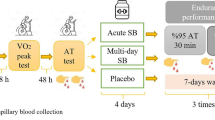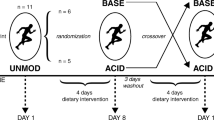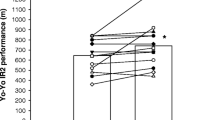Abstract
The aim of the present study was to examine the effects of sodium bicarbonate (NaHCO3) administration on lower-body, hypertrophy-type resistance exercise (HRE). Using a double-blind randomized counterbalanced design, 12 resistance-trained male participants (mean ± SD; age = 20.3 ± 2 years, mass = 88.3 ± 13.2 kg, height = 1.80 ± 0.07 m) ingested 0.3 g kg−1 of NaHCO3 or placebo 60 min before initiation of an HRE regimen. The protocol employed multiple exercises: squat, leg press, and knee extension, utilizing four sets each, with 10–12 repetition-maximum loads and short rest periods between sets. Exercise performance was determined by total repetitions generated during each exercise, total accumulated repetitions, and a performance test involving a fifth set of knee extensions to failure. Arterialized capillary blood was collected via fingertip puncture at four time points and analyzed for pH, [HCO3 −], base excess (BE), and lactate [Lac−]. NaHCO3 supplementation induced a significant alkaline state (pH: NaHCO3: 7.49 ± 0.02, placebo: 7.42 ± 0.02, P < 0.05; [HCO3 −]: NaHCO3: 31.50 ± 2.59, placebo: 25.38 ± 1.78 mEq L−1, P < 0.05; BE: NaHCO3: 7.92 ± 2.57, placebo: 1.08 ± 2.11 mEq L−1, P < 0.05). NaHCO3 administration resulted in significantly more total repetitions than placebo (NaHCO3: 139.8 ± 13.2, placebo: 134.4 ± 13.5), as well as significantly greater blood [Lac−] after the exercise protocol (NaHCO3: 17.92 ± 2.08, placebo: 15.55 ± 2.50 mM, P < 0.05). These findings demonstrate ergogenic efficacy for NaHCO3 during HRE and warrant further investigation into chronic training applications.
Similar content being viewed by others
References
ACSM (2009) Position stand: progression models in resistance training for healthy adults. Med Sci Sports Exerc 41(3):687–708
Allen DG, Westerblad H, Lannergren J (1995) The role of intracellular acidosis in muscle fatigue. In: Gandevia SC, Enoka RM, McComas AJ, Stuart DG, Thomas CK (eds) Advances in experimental medicine and biology. Plenum Press, New York, pp 57–68
Artioli GG, Gualano B, Coelho DF, Benatti FB, Gailey AW, Lancha AH Jr (2007) Does sodium-bicarbonate ingestion improve simulated Judo performance? Int J Sport Nutr Exerc Metab 17(2):206–217
Bird SP, Tarpenning KM, Marino FE (2005) Designing resistance training programmes to enhance muscular fitness: a review of the acute programme variables. Sport Med 35(10):841–851
Chin ER, Allen DG (1998) The contribution of pH-dependent mechanisms to fatigue at different intensities in mammalian single muscle fibres. J Physiol 512(3):831–840
Coombes J, McNaughton LR (1993) Effects of bicarbonate ingestion on leg strength and power during isokinetic knee flexion and extension. J Strength Cond Res 7(4):241–249
Costill DL, Verstappen F, Kuipers H, Janssen E, Fink W (1984) Acid–base balance during repeated bouts of exercise: influence of HCO3. Int J Sports Med 5(5):228–231
Dascombe BJ, Reaburn PR, Sirotic AC, Coutts AJ (2007) The reliability of the i-STAT clinical portable analyser. J Sci Med Sport 10(3):135–140
de Salles BF, Simao R, Miranda F, Novaes Jda S, Lemos A, Willardson JM (2009) Rest interval between sets in strength training. Sport Med 39(9):765–777
Douroudos I, Fatouros IG, Gourgoulis V, Jamurtas AZ, Tsitsios T, Hatzinikolaou A et al (2006) Dose-related effects of prolonged NaHCO3 ingestion during high-intensity exercise. Med Sci Sports Exerc 38(10):1746–1753
Edge J, Bishop D, Goodman C (2006) Effects of chronic NaHCO3 ingestion during interval training on changes to muscle buffer capacity, metabolism, and short-term endurance performance. J Appl Physiol 101(3):918–925
Elias AN, Wilson AF, Naqvi S, Pandian MR (1997) Effects of blood pH and blood lactate on growth hormone, prolactin, and gonadotropin release after acute exercise in male volunteers. Proc Soc Exp Biol Med 214(2):156–160
Epley B (1985) Poundage chart. In: Boyd Epley Workout. Body Enterprises, Lincoln, NE
Fitts RH (1994) Cellular mechanisms of muscle fatigue. Physiol Rev 74(1):49–94
Fleck SJ, Kraemer WJ (1988) Resistance training: basic principles (part 1 of 4). Physician Sports Med 16:160–171
Fry AC (2004) The role of resistance exercise intensity on muscle fibre adaptations. Sports Med 34(10):663–679
Gao J, Costill DL, Horswill CA, Park SH (1988) Sodium bicarbonate ingestion improves performance in interval swimming. Eur J Appl Physiol 58(1/2):171–174
Godfrey RJ, Madgwick Z, Whyte GP (2003) The exercise-induced growth hormone response in athletes. Sports Med 33(8):599–613
Gordon SE, Kraemer WJ, Vos NH, Lynch JM, Knuttger HG (1994) Effect of acid–base balance on the growth hormone response to acute high-intensity cycle exercise. J Appl Physiol 76(2):821–829
Gotshalk LA, Loebel C, Nindl BC et al (1997) Hormonal responses of multi-set versus single set heavy resistance exercise protocols. Can J Appl Physiol 22:244–255
Hollidge-Horvat MG, Parolin ML, Wong D, Jones NL, Heigenhauser GJ (2000) Effect of induced metabolic alkalosis on human skeletal muscle metabolism during exercise. Am J Physiol Endocrinol Metab 41(2):E316–E329
Kraemer RR, Kilgore JL, Kraemer GR, Castracane VD (1992) Growth hormone, IGF-I, and testosterone responses to resistive exercise. Med Sci Sports Exerc 24(12):1346–1352
Kraemer WJ, Harman FS, Vos NH et al (2000) Effects of exercise and alkalosis on serum insulin-like growth factor I and IGF-binding protein-3. Can J Appl Physiol 25(2):127–137
Lambert CP, Flynn MG (2002) Fatigue during high-intensity intermittent exercise: application to bodybuilding. Sports Med 32(8):511–522
Linnamo V, Pakarinen A, Komi PV, Kraemer WJ, Häkkinen K (2005) Acute hormonal responses to submaximal and maximal heavy resistance and explosive exercises in men and women. J Strength Cond Res 19(3):566–571
Matson LG, Tran ZV (1993) Effects of sodium bicarbonate ingestion on anaerobic performance: a meta-analytic review. Int J Sport Nutr 3(1):2–28
Maughan RJ, Leiper JB, Litchfield PE (1986) The effects of induced acidosis and alkalosis on isometric endurance capacity in man. In: Dotson CO, Humphrey JH (eds) Exercise physiology: current selected research, vol 2. AMS Press, New York, pp 73–82
McKenzie DC, Coutts KD, Stirling DR, Hoeben HH, Kuzara G (1986) Maximal work production following two levels of artificially induced metabolic alkalosis. J Sport Sci 4(1):35–38
McNaughton L, Siegler J, Midgley A (2008) Ergogenic effects of sodium bicarbonate. Curr Sports Med Rep 7(4):230–236
Medbo JI, Tabata I (1993) Anaerobic energy release in working muscle during 30 s to 3 min of exhausting bicycling. J Appl Physiol 75(4):1654–1660
Messonnier L, Kristensen M, Juel C, Denis C (2007) Importance of pH regulation and lactate/H+ transport capacity for work production during supramaximal exercise in humans. J Appl Physiol 102(5):1936–1944
Portington KJ, Pascoe DD, Webster MJ, Anderson LH, Rutland RR, Gladden LB (1998) Effect of induced alkalosis on exhaustive leg press performance. Med Sci Sports Exerc 30(4):523–528
Raymer GH, Marsh GD, Kowalchuk JM, Terry TR (2004) Metabolic effects of induced alkalosis during progressive forearm exercise to fatigue. J Appl Physiol 96(6):2050–2056
Rico H, Paez E, Aznar L, Hernandez ER, Seco S, Villa LF (2001) Effects of sodium bicarbonate supplementation on axial and peripheral bone mass in rats on strenuous treadmill training exercise. J Bone Miner Metab 19:97–101
Siegler JC, Hirscher K (2010) Sodium bicarbonate ingestion and boxing performance. J Strength Cond Res 24(1):103–108
Siegler JC, Midgley AW, Polman RC, Lever R (2010) Effects of various sodium bicarbonate loading protocols on the time-dependent extracellular buffering profile. J Strength Cond Res 24(9):2551–2557
Smilios I, Pilianidis T, Karamouzis M, Tokmakidis SP (2003) Hormonal responses after various resistance exercise protocols. Med Sci Sports Exerc 35(4):644–654
Stephens TJ, McKenna MJ, Canny BJ, Snow RJ, McConell GK (2002) Effect of sodium bicarbonate on muscle metabolism during intense endurance cycling. Med Sci Sports Exerc 34(4):614–621
Sutton JR, Jones NL, Toews CJ (1976) Growth hormone secretion in acid–base alterations at rest and during exercise. Clin Sci 50(4):241–247
Sutton JR, Jones NL, Toews CJ (1981) Effect of pH on muscle glycolysis during exercise. Clin Sci 61(3):331–338
Tarpenning KM, Wiswell RA, Hawkins SA, Marcell TJ (2001) Influence of weight training exercise and modification of hormonal response on skeletal muscle growth. J Sci Med Sport 4(4):431–446
Trivedi B, Danforth WH (1966) Effects of pH on the kinetics of frog muscle phosphofructokinase. J Biol Chem 241:4110–4114
Verbitsky O, Mizrahi J, Levin M, Isakov E (1997) Effect of ingested sodium bicarbonate on muscle force, fatigue, and recovery. J Appl Physiol 83(2):333–337
Wahl P, Zinner C, Achtzehn S, Bloch W, Mester J (2010) Effect of high- and low-intensity exercise and metabolic acidosis on levels of GH, IGF-I, IGFBP-3 and cortisol. Growth Horm IGF Res 20(5):380–385
Webster MJ, Webster MN, Crawford RE, Gladden LB (1993) Effect of sodium bicarbonate ingestion on exhaustive resistance exercise performance. Med Sci Sport Exerc 25(8):960–965
Zajac A, Cholewa J, Poprzecki S, Waskiewicz Z, Langfort J (2009) Effects of sodium bicarbonate ingestion on swim performance in youth athletes. J Sports Sci Med 8(1):45–50
Zavorsky GS, Lands LC, Schneider W, Carli F (2005) Comparison of fingertip to arterial blood samples at rest and during exercise. Clin J Sport Med 15(4):263–270
Acknowledgments
Funding was not received for this work from the National Institutions of Health, Wellcome Trust, Howard Hughes Medical Institute, or others. The authors declare no conflict of interest. The results of the present study do not constitute endorsement by Springer. Benjamin Carr, Michael Webster, Joseph Boyd, Geoffrey Hudson, and Timothy Scheett declare no conflicts of interest.
Author information
Authors and Affiliations
Corresponding author
Additional information
Communicated by William J. Kraemer.
Rights and permissions
About this article
Cite this article
Carr, B.M., Webster, M.J., Boyd, J.C. et al. Sodium bicarbonate supplementation improves hypertrophy-type resistance exercise performance. Eur J Appl Physiol 113, 743–752 (2013). https://doi.org/10.1007/s00421-012-2484-8
Received:
Accepted:
Published:
Issue Date:
DOI: https://doi.org/10.1007/s00421-012-2484-8




